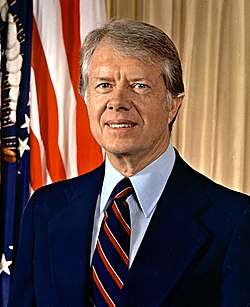Jimmy Carter Quote
In his early twenties, a man started collecting paintings, many of which later became famous: Picasso, Van Gogh, and others. Over the decades he amassed a wonderful collection. Eventually, the man’s beloved son was drafted into the military and sent to Vietnam, where he died while trying to save his friend. About a month after the war ended, a young man knocked on the devastated father’s door. Sir, he said, I know that you like great art, and I have brought you something not very great. Inside the package, the father found a portrait of his son. With tears running down his cheeks, the father said, I want to pay you for this.ℍ No, the young man replied, he saved my life. You don’t owe me anything.ℍ The father cherished the painting and put it in the center of his collection. Whenever people came to visit, he made them look at it. When the man died, his art collection went up for sale. A large crowd of enthusiastic collectors gathered. First up for sale was the amateur portrait. A wave of displeasure rippled through the crowd. Let’s forget about that painting! one said. We want to bid on the valuable ones, said another. Despite many loud complaints, the auctioneer insisted on starting with the portrait. Finally, the deceased man’s gardener said, I’ll bid ten dollars.ℍ Hearing no further bids, the auctioneer called out, Sold for ten dollars! Everyone breathed a sigh of relief. But then the auctioneer said, And that concludes the auction. Furious gasps shook the room. The auctioneer explained, Let me read the stipulation in the will: Sell the portrait of my son first, and whoever buys it gets the entire art collection. Whoever takes my son gets everything.ℍ It’s the same way with God Almighty. Whoever takes his Son gets everything.
In his early twenties, a man started collecting paintings, many of which later became famous: Picasso, Van Gogh, and others. Over the decades he amassed a wonderful collection. Eventually, the man’s beloved son was drafted into the military and sent to Vietnam, where he died while trying to save his friend. About a month after the war ended, a young man knocked on the devastated father’s door. Sir, he said, I know that you like great art, and I have brought you something not very great. Inside the package, the father found a portrait of his son. With tears running down his cheeks, the father said, I want to pay you for this.ℍ No, the young man replied, he saved my life. You don’t owe me anything.ℍ The father cherished the painting and put it in the center of his collection. Whenever people came to visit, he made them look at it. When the man died, his art collection went up for sale. A large crowd of enthusiastic collectors gathered. First up for sale was the amateur portrait. A wave of displeasure rippled through the crowd. Let’s forget about that painting! one said. We want to bid on the valuable ones, said another. Despite many loud complaints, the auctioneer insisted on starting with the portrait. Finally, the deceased man’s gardener said, I’ll bid ten dollars.ℍ Hearing no further bids, the auctioneer called out, Sold for ten dollars! Everyone breathed a sigh of relief. But then the auctioneer said, And that concludes the auction. Furious gasps shook the room. The auctioneer explained, Let me read the stipulation in the will: Sell the portrait of my son first, and whoever buys it gets the entire art collection. Whoever takes my son gets everything.ℍ It’s the same way with God Almighty. Whoever takes his Son gets everything.
Related Quotes
People lack morals, good moral character is important in every aspect of your life. Honesty and Integrity opens the door. Your character allows others to see you for who you truly are. Make your first...
About Jimmy Carter
Born in Plains, Georgia, Carter graduated from the U.S. Naval Academy in 1946 and joined the submarine service before returning to his family's peanut farm. He was active in the civil rights movement, then served as state senator and governor before running for president in 1976. He secured the Democratic nomination as a dark horse little known outside his home state before narrowly defeating Republican incumbent Gerald Ford in the general election.
As president, Carter pardoned all Vietnam draft evaders and negotiated major foreign policy agreements, including the Camp David Accords, the Panama Canal Treaties, and the second round of Strategic Arms Limitation Talks, and he established diplomatic relations with China. He created a national energy policy that included conservation, price control, and new technology. He signed bills that created the Departments of Energy and Education. The later years of his presidency were marked by several foreign policy crises, including the Soviet invasion of Afghanistan (leading to the end of détente and the 1980 Olympics boycott) and the fallout of the Iranian Revolution (including the Iran hostage crisis and 1979 oil crisis). Carter sought reelection in 1980, defeating a primary challenge by Senator Ted Kennedy, but lost the election to Republican nominee Ronald Reagan.
Polls of historians and political scientists have ranked Carter's presidency below average. His post-presidency—the longest in U.S. history—is viewed more favorably. After Carter's presidential term ended, he established the Carter Center to promote human rights, earning him the 2002 Nobel Peace Prize. He traveled extensively to conduct peace negotiations, monitor elections, and end neglected tropical diseases, becoming a major contributor to the eradication of dracunculiasis. Carter was a key figure in the nonprofit housing organization Habitat for Humanity. He also wrote political memoirs and other books, commentary on the Israeli–Palestinian conflict, and poetry.
